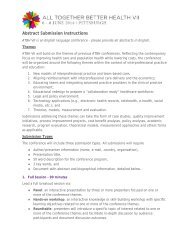Health and Social Care Policy and the Interprofessional ... - CAIPE
Health and Social Care Policy and the Interprofessional ... - CAIPE
Health and Social Care Policy and the Interprofessional ... - CAIPE
Create successful ePaper yourself
Turn your PDF publications into a flip-book with our unique Google optimized e-Paper software.
Chapter 1 - Europe’s <strong>Policy</strong> Agenda<br />
Summary<br />
There are numerous challenges ahead for <strong>the</strong> people of Europe. With fewer<br />
children being born <strong>and</strong> with an ageing population, it is crucial that high quality<br />
integrated models of health <strong>and</strong> social care are implemented without delay.<br />
High quality health <strong>and</strong> social care implies that it is cost affordable, efficient,<br />
innovative <strong>and</strong> synergistic, uses available resources wisely <strong>and</strong> ultimately is fit<br />
for <strong>the</strong> purpose intended.<br />
High quality health <strong>and</strong> social care however, are very expensive commodities<br />
hence it is not surprising that <strong>the</strong> EU, its member states, <strong>the</strong> WHO <strong>and</strong> o<strong>the</strong>r<br />
health related NGOs are working in partnership to develop policies that<br />
enable Europeans to live long, healthy <strong>and</strong> productive lives from cradle to<br />
grave, through an intensive public health programme. Recent EU <strong>and</strong> WHO<br />
European Region policy m<strong>and</strong>ates <strong>the</strong> need for interprofessional, interagency<br />
<strong>and</strong> inter-sectoral practice in health <strong>and</strong> social care. <strong>Policy</strong> also m<strong>and</strong>ates a<br />
more inclusive partnership with o<strong>the</strong>r Directorates, including <strong>the</strong> environment,<br />
transport, agriculture, whose policies impact on <strong>the</strong> health <strong>and</strong> well being of<br />
Europeans.<br />
The majority of people however will experience periods of ill health at some<br />
stage of <strong>the</strong>ir lives. Some will have to learn to adapt to, <strong>and</strong> live with, long<br />
term conditions that limit or change <strong>the</strong>ir life styles forever. With an ageing<br />
population <strong>the</strong> number of people living with a long-term conditions is predicted<br />
to rise, each of whom will require <strong>the</strong> skills of an interagency interprofessional<br />
workforce.<br />
<strong>Policy</strong> makers <strong>and</strong> strategists have made it crystal clear that <strong>the</strong> creation of an<br />
interprofessional workforce is critical for <strong>the</strong> health <strong>and</strong> welfare of future<br />
generations <strong>and</strong> to ignore <strong>the</strong>ir advice would, at <strong>the</strong> very least, be foolhardy.<br />
Setting <strong>the</strong> scene<br />
It is tempting from <strong>the</strong> outset of this paper to write that, almost without<br />
exception, every policy paper relating to <strong>the</strong> health of Europe’s population,<br />
assumes implicitly <strong>and</strong> in some cases explicitly, that interprofessional,<br />
interagency, inter-sectoral practice is <strong>the</strong> norm. Indeed analysing recent <strong>and</strong><br />
current policy it is now hard to defend <strong>the</strong> continuing reluctance, <strong>and</strong> dare one<br />
say active resistance, of hard-core protagonists, to developing patient led<br />
collaborative interprofessional partnerships.<br />
An ageing population in Europe is placing increasing dem<strong>and</strong>s on <strong>the</strong> welfare<br />
state. Older people, by definition, are more likely to experience ill health <strong>and</strong><br />
long-term conditions that impact on <strong>the</strong>ir ability to live independent lives.<br />
Many will need increasing care <strong>and</strong> support as <strong>the</strong>y move towards <strong>the</strong> end of<br />
<strong>the</strong>ir lives. The support of social care services in enabling people to live as<br />
4













